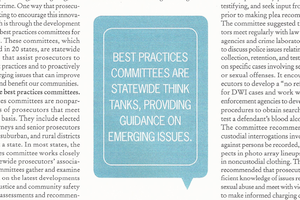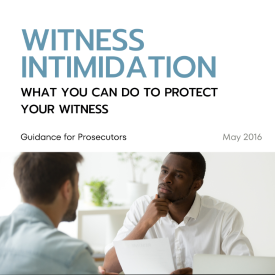Statewide Best Practices Committees for Prosecutors: A Nationwide Movement

Author(s): Kristine Hamann, Rebecca Rader Brown
A prosecutor’s core mission is and has always been to promote justice and to protect the community by ensuring public safety. Over the past 30 years, the way prosecutors approach this mission has evolved. In place of the old, reactive criminal justice model, prosecutors and police are using new methods and evidence to take a proactive, broader approach to preventing, investigating, and prosecuting crime.
Read MoreProsecutor Seminars in Law Schools
Prosecutor-focused courses in law schools are an excellent way for prosecutors to expose law students to their work and to have students available to do research on prosecution issues. Statewide Best Practices Committees have benefited from working with their local law schools to develop classes that can focus on emerging issues and policy questions.
Read MoreCommunity Programs
One of the many benefits of being part of the Best Practices network is the ability to share information with prosecutors across the country about promising programs and how to implement them. Prosecutors’ Center for Excellence (PCE) held a two-day conference in Boston on July 19 and 20, 2016 with prosecutors from 17 states in attendance. One topic was how to create community programs on a shoe string.
Here is a sampling of the varied – and excellent – programs highlighted during the meeting:
Read MoreConsiderations for Assessing Jailhouse Informants

An often difficult decision faced by prosecutors is whether to use evidence provided by a so-called jailhouse informant. Individuals, when incarcerated, may let their guard down with other inmates and speak freely about the crime with which they have been charged. They may also (perhaps falsely) claim to have committed some heinous act simply in an effort to “impress” fellow inmates. At the same time, inmates facing other charges may try to barter with law enforcement, providing information allegedly learned from a fellow inmate in exchange for some benefit, such as a lesser sentence.
Read MoreApproaches to Reporting the Results of Investigations into Police Involved Fatalities
June 30, 2016 — Volume 15
There has been great scrutiny of police-involved fatalities and how they are handled by prosecutors. Here are four thoughtful approaches by prosecutors on how they have reported their findings when no criminal charges are brought (in alphabetical order by jurisdiction). Three articles on this subject are also included.
Read MoreRecording Interrogations – Support by Prosecutors
June 23, 2016 — Volume 14
Around the country, prosecutors have supported the recording of custodial interrogations and have pushed for the creation of voluntary policies and, in some instances, endorsed legislation. Police have embraced this technology as well. The Colorado Best Practices Committee issued a report providing a national perspective on the progress made in this area. Also included are sample policies and articles from other states that reflect prosecutor’s leadership in promoting the recording of interrogations. Much of this work was spearheaded by Best Practices Committees.
Read MoreWitness Intimidation: What You Can Do To Protect Your Witness

Witness intimidation and witness tampering can occur in any case, from simple misdemeanors to homicides. It has a variety of consequences from the silencing of an entire community, to the murder of a witness, to the recantation of truthful testimony. Though witness intimidation is an insidious problem, there are strategies throughout the investigation and prosecution of a case that can help to keep a witness safe and reduce the impact of intimidation.
Authors: PCE
Jury Instructions v. Expert Testimony
New Study: Expanded Eyewitness Jury Instruction Makes Jurors Suspicious of Any Eyewitness — Even in Strong Cases
Defense attorneys are increasingly seeking expanded jury instructions on the reliability of eyewitnesses in lieu of calling a defense expert. A recent study in New Jersey has demonstrated that jurors who received these instructions “indiscriminately discounted ‘weak’ and ‘strong’ testimony in equal measure.”
Read More‘Making a Murderer’ and the Ethics of a Private Investigative Project
“Making a Murderer” has triggered much discussion about the criminal justice system. However, it has also raised questions about the ethics of investigative reporting. The recent New Yorker article below makes the point that “a private investigative project, bound by no rules of procedure, is answerable only to ratings and the ethics of its makers.”
Dead Certainty, How ‘Making a Murderer’ Goes Wrong, The New Yorker (1/25/16) Read
Read More